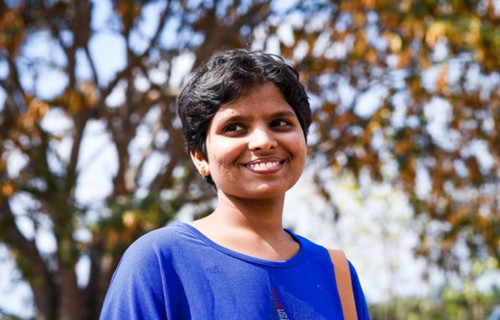根据BBC的记者比斯瓦斯报道,2016年3月,一名22岁的男子在印度南部拥挤的道路上被砍死,因为他娶了一个更高种姓的女子。他的妻子在袭击中幸存下来,并作证对抗她的父母,反对种姓制度带来的灾难。

On the last day of his life, Shankar and Kausalya woke up around nine in the morning in their village hut. They had been married eight months.
在他生命的最后一天,尚卡尔和考莎丽雅在早上9点左右在他们的村庄里醒来。那天他们已经结婚八个月了。
It was Sunday, and they travelled in a public bus to a local market in Udumalpet, some 14km (8.6 miles) away. They wanted to shop for new clothes for Shankar, who had to attend a function at his college the next day.
那是星期天,他们乘公共汽车去了乌杜玛尔特的一个当地市场,离这里大约14公里(8.6英里)。他们想要为尚卡尔买新衣服,第二天他要在他的大学里参加一个活动。
The sun was beating down hard when they entered a clothes shop. She spotted a pink shirt and thought her husband would look good in it. As they walked out, Shankar spotted a mannequin in the shop window wearing a green shirt.
当他们走进一家服装店时,太阳炙烤着。考莎丽雅发现了一件粉红色的衬衫,她觉得丈夫穿会很好看。当他们走出去的时候,尚卡尔在商店橱窗里发现了一个穿着绿色衬衫的模特。
"I think I like this shirt better," he said.
他说:“我觉得这件更好看。”

Casual murder
草菅人命
They walked back in again, exchanged the pink for the green, stepped out of the shop and began crossing a crowded road on their way back to take a bus home. But first, Shankar told Kausalya, he would like to treat her to her favourite chilli snack.
他们又走了回来,把粉色换成了绿色,走出了商店,在回家的路上走了一条拥挤的路。然后,尚卡尔对考莎丽雅说,他想要给她吃到她最喜欢的辣椒零食。
"Another day," Kausalya said.
考莎丽雅说:“改天吧。”
She had only sixty rupees (94 cents; 68p) in her purse, and they couldn’t afford it. So they decided to return home, where Shankar promised to cook her a special meal.
她钱包里只剩下60卢比了,没有多余的钱买零食了。于是,他们决定回家,尚卡尔答应给她做一顿特别的饭菜。
CCTV footage showed the couple walking briskly towards the road. But before they could cross, five men, riding on two bikes, halted behind them. Four of the men sauntered up to the couple and attacked them with long knives. The casualness with which the murderers fell upon them was chilling. They slashed the couple as if they were pruning bushes.
闭路电视画面显示,这对夫妇轻快地走向马路。但是,在他们还没过马路之前,有五个人骑着两辆自行车,停在他们后面。其中四个人闲逛到这对夫妇,用长刀袭击他们。凶手在他们身上所犯的这种随意的行为让人不寒而栗。他们像修剪灌木一样向这对夫妇砍去。当他们被袭击时,他们正走在一条繁忙的街道上。
Bleeding profusely, Shankar scrambled to run away. Kausalya limped towards a stationary SUV, when she was felled again by her assailants.
因流血过量,尚卡尔匆忙逃跑。袭击者跑来再次将考莎丽雅击倒,她一瘸一跛地走向一辆停着的SUV。

It was all over in 36 seconds. The men returned to their motorcycles and left leisurely as a crowd began to collect. (The police later found six people came on three bikes, two bearing false number plates. Five of them attacked the couple, while one man kept watch.)
整个事情的发生过程只有36秒。这些人回到他们的摩托车上,在人群开始聚集的时候悠闲地离开了。(警方后来发现,有六个人骑着三辆自行车,两辆带有假车牌。其中有5个人袭击了这对夫妇,而另一个人则在一旁看守。
An ambulance arrived soon and scooped the couple off the blooded-slicked tarmac. On the way to the hospital, 60km away, the medic inexplicably sat in the front seat. On the metal stretcher, Kausalya, her vision blurring, held the IV drip. Shankar lay still.
一辆救护车很快赶到,把这对夫妇从碎石路上的血泊里上救了起来。在前往60公里外的医院的路上,医生莫名其妙地坐在了前排座位上。在金属担架上,考莎丽雅的视力模糊,手上挂着吊瓶。尚卡尔躺着一动不动。
"Rest your head on my chest," he rasped. Kausalya moved to his side.
“把你的头枕在我的胸口上,”尚卡尔说。考莎丽雅挪到了他的身边。
Minutes later, as the ambulance entered the hospital, Shankar stopped breathing.
几分钟后,当救护车进入医院时,尚卡尔停止了呼吸。
Autopsy surgeons found 34 cuts and stab wounds on Shankar’s "moderately nourished body". He had died of "shock and haemorrhage due to multiple cuts and stab injuries".
尸检外科医生发现,尚卡尔的“适度健康的身体”有34个伤口和刺伤。他死于“因多次割伤和刺伤而造成的休克和出血”。
Kausalya spent 20 days in the hospital, her face swathed in bandages, and waiting for 36 stitches to heal and a bone fracture to repair. She told the police from the hospital bed that her parents were responsible for the attack.
考莎丽雅在医院里呆了20天,她的脸上裹着绷带,等待着36针的愈合和骨折的修复。她在医院的病床上告诉警方,她的父母要对这次袭击负责。
"Why did you love him?" one of the attackers kept shouting as he stabbed her. "Why?"
“你为什么爱他?”其中一名袭击者在刺伤她时仍在大喊大叫。“为什么?”
Shankar and Kausalya had broken what writer Arundhati Roy, in her Booker-prize winning novel, The God of Small Things, described as "Love Laws" that "lay down who should be loved … And how … And how much".
尚卡尔和考莎丽雅打破了作家阿兰达蒂·洛伊在她的“布克文学奖”获奖小说《爱情法则》中所描述的“放下那些应该被爱的人,如何放下,以何种程度放下”。
Shankar was a Dalit (formerly known as untouchable), and the son of a landless daily wage farm worker, who lived in a single room hut with four family members in Kumaralingam village. Kausalya came from a relatively influential Thevar caste, the daughter of a 38-year-old money lender and taxi operator, who lived in a two-storey house in Palani, a small town.
尚卡尔是“达利特”(以前被称为“贱民”),他是一个没有土地的工资农场工人的儿子,他和四个家庭成员住在一个小房间里,住在库马拉林姆村。考莎丽雅来自一个相对有影响力的Thevar种姓,她是一名38岁的放贷者和出租车司机的女儿,住在一个小镇帕拉尼的两层楼里。
When she told her parents she wanted to become an air-hostess, they rejected the idea "saying I would have to wear short skirts." After she finished school in 2014, they took her to a family temple to meet men they wanted her to marry. When she refused, they sent her to her a private college to study computer science and engineering.
当她告诉父母她想成为一名空姐时,他们拒绝了“说我必须穿短裙”的想法。2014年她完成学业后,他们带她去了一个家庭寺庙,与他们想要她结婚的男人见面。当她拒绝的时候,他们把她送到了一所私立大学学习计算机科学和工程。
She hated college. "There were too many restrictions. We could not venture outside the campus. We could not talk to the boys. Male and female students sat separately in the classroom. On the college bus, we sat in different sections. If the security saw us talking to the boys, they would inform our parents. It was very stifling."
她讨厌学校。“有太多的限制。我们不能在校园外冒险。我们不能和男孩说话。男女学生分别坐在教室里。在大学公共汽车上,我们坐在不同的地方。如果保安看到我们和男孩说话,他们就会通知我们的父母。非常令人窒息。”
Respectful friends’
做互相尊敬的朋友
But love can happen even in the unlikeliest of places. At the college freshers function, a lanky engineering student walked up to her, introduced himself as Shankar and asked her, "Are you in love with anyone?"
但即使在最不可能的地方,爱也会发生。在大学新生集会中,一个瘦长的工程系学生走到她的面前,自我介绍说自己叫尚卡尔,他问考莎丽雅:“你有爱的人吗?”
Kausalya says she didn’t answer and walked away, feeling embarrassed.
考莎丽雅说,她没有回答,然后走开了,感到有些尴尬。
The next day, Shankar went up to her and qualified the unanswered question: "Are you in love with anyone because I think I love you." She slunk away again.
第二天,尚卡尔走到她的身边,又问了一次这个没有回答的问题:“你是否爱上什么人了,因为我想我爱你。”她又偷偷溜走了。
On the third day, when Shankar again walked up to her, she told him to "look for another girl". "People will know if we go out. It will be difficult to know you," she said.
第三天,当尚卡尔再次走到她身边时,她告诉他“你去寻找另一个女孩吧。如果我们出去,人们会知道的。”
She began warming to him slowly though. Shankar had stopped telling her that he loved her, so "we behaved like "respectful friends". "I also didn’t tell him I loved him, but over time it crept up on me".
她对他的态度慢慢有所好转。尚卡尔已经不再告诉她,他爱她,所以“我们表现得像“互相尊敬的朋友”。“我也没有告诉他我爱他,但随着时间的推移,我慢慢爱上了他。”
It was hard-earned love. Since she couldn’t step outside her home alone to speak on the phone, they exchanged WhatsApp messages on their college bus rides. Every day, for 18 months, they exchanged texts. They spoke about their hopes and dreams.
这场爱来的不容易。由于她无法独自走出家门,或者打电话,他们在大学巴士上互发了WhatsApp的信息。在18个月的时间里,他们互发短信。他们谈到了他们的希望和梦想。
"I have two dreams," he texted her one day. "Build a proper house for the family. And love you forever."
“我有两个梦想,”一天他给她发短信说。“为家里建造一套合适的房子。”和“永远爱你”。
In her second year, she signed up for Japanese language classes, so she could stay beyond college hours and take a public bus home. Shankar would wait for her, and they began chatting on the bus.
大二那年,她报名参加了日语课程,这样她就可以在大学以外的时间里,坐公共汽车回家。尚卡尔会等她,他们开始在公共汽车上聊天。
But one day in July 2015 the bus conductor saw them chatting, found out where Kausalya lived and informed her mother. The same evening, her parents took away her phone, called up Shankar and warned him to stay away from their daughter. They told her that Shankar would "make her pregnant and run away". The next day, they took her out of college.
但2015年7月的一天,公共汽车售票员看到他们在聊天,发现考莎丽雅的住处,并告诉了她的母亲。当天晚上,她的父母拿走了她的手机,打电话给尚卡尔,并警告他离开他们的女儿。他们告诉考莎丽雅,尚卡尔会“让她怀孕,逃跑”。第二天,他们把她带出了大学。
She cried all night and woke up next morning in an empty house - her parents had gone out. She looked for her phone, found it, and called Shankar to tell him about the fight with her parents. She asked him whether he planned to make her pregnant and run away.
她哭了一整晚,第二天早上在一个空房子里醒来——她的父母已经出去了。她寻找她的手机,找到了,并打电话给尚卡尔,告诉了他她和父母的争吵。她问他能否让她怀孕,然后逃跑。
"If you feel that way, we can run away right now, and get married," Shankar said.
尚卡尔告诉她说:“如果你有这样的感觉,我们现在就可以逃跑,结婚。”
Kausalya packed a bag, left home and went to the local bus stop. The next day, on 12 July 2015, they went to a temple and got married. Then they went to the local police station, reported their inter-caste marriage and sought protection. Dalits and tribes-people bear the brunt of caste brutality in Tamil Nadu: there were more than 1,700 reported crimes against them that year alone.
考莎丽雅收拾了一个袋子,离开了家,去了当地的公共汽车站。第二天,2015年7月12日,他们去了一座寺庙,结婚了。然后他们去了当地的警察局,报告了他们的跨种姓婚姻,并寻求保护。在泰米尔那德邦,达利特和特里布尔人深受种姓制度的迫害:仅在一年的时间里,就有超过1700起针对他们的犯罪行为。
The next eight months, says Kausalya, were "the freest, happiest time" of her life. She moved to Shankar’s hut - which they shared with his father, two brothers and his grandmother - dropped out of college, and began work as a salesgirl, earning a monthly salary of 5,000 rupees.
考莎丽雅说,接下来的八个月是她一生中最自由、最快乐的时光。她搬到尚卡尔的小屋,他们和他的父亲、两个兄弟和他的祖母住在一起,考莎丽雅辍了学,开始了一个女售货员的工作,月薪5000卢比。
Her parents and relatives tried hard to separate them: they filed a police complaint saying Shankar had kidnapped their daughter; and a week after her marriage, abducted her and took her to shamans and priests who smeared ash on her face and force-fed her potions, pressuring her to leave her husband. Exhausted, they finally gave up and Shankar took her home. Then her parents offered Shankar a million rupees to leave Kausalya.
她的父母和亲戚都试图把他们分开:他们向警察提交了一份诉讼,说尚卡尔绑架了他们的女儿;在她结婚一周后,他们绑走了她,带她去了萨满和牧师那里,往她脸上涂灰,强迫她喝药水,迫使她离开她的丈夫。等折腾累了,他们终于放弃了,尚卡尔把她带回家。然后,她的父母给了尚卡尔100万卢比,让他离开考莎丽雅。
A week before the murder, Kausalya says, her parents visited their home and ordered her to come with them. She refused to budge.
考莎丽雅说,在谋杀发生前一周,她的父母拜访了他们的家,命令她跟他们走。她没有答应。
We are not responsible’
我们概不负责
"If something happens to you after today, we are not responsible," her father told her, before leaving.
“如果今天以后发生了什么事,我们就不负责了,”她父亲在离开前告诉她。
Police found Kausalya’s father had hired five men with previous criminal records for 50,000 rupees to kill his daughter and son-in-law in broad daylight "to send out a public message" about what happens when a woman falls in love with a lower-caste man.
警方发现,考莎丽雅的父亲用5万卢比雇佣了5名有犯罪前科的男子,在光天化日之下试图杀死了他的女儿和女婿,想“向公众传达了一个信息”:当一个女人爱上一个低种姓的男人时,会发生什么。
There were 120 witnesses to the murder. Kausalya herself opposed the bail of her parents 58 times in the court. "My mother threatened me repeatedly that she would kill me. She told me I was better off dead than married to him," Kausalya told the judge.
谋杀案有120名目击者。考莎丽雅本人在法庭上反对她的父母的58次保释。考莎丽雅对法官说:“我母亲一再威胁我说她会杀了我。她告诉我,我死了比嫁给尚卡尔好。”
In December, Judge Alamelu Natarajan sentenced six men, including Kausalya’s father, to death. Her mother was acquitted along with two others.
去年12月,法官Alamelu Natarajan对包括考莎丽雅的父亲在内的六名男子判处死刑。她的母亲和另外两个人一起被判无罪。
Kausalya is set to appeal against the acquittal, as she believes her mother was equally guilty.
考莎丽雅将对其母亲的无罪释放提出上诉,因为她认为她的母亲同样有罪。
There was a time after Shankar’s murder, she said, she would break down frequently, and wanted to take her life. Then she cut her hair short, began learning karate, and reading books on caste. She began meeting anti-caste groups and speaking out against caste crimes. She also learned to play the parai, a drum traditionally played by Dalits.
她说,在尚卡尔被谋杀后的一段时间里,她经常会崩溃,并想要杀了自己的母亲。然后她剪短头发,开始学习空手道,阅读有关种姓的书籍。她开始与反种姓团体会面,公开反对种姓犯罪。她还学会了演奏帕莱,这是一种传统上由达利特演奏的鼓。
Today, she has realised Shankar’s dream by constructing a four-room house for his family from the compensation she received from the government, and started a tuition centre for poor students in the village. To run the family, she has taken a clerk’s job in a government office. At weekends, she travels all over Tamil Nadu, speaking at meetings against caste, honour killings and emphasising the "importance of love".
今天,她已经实现了尚卡尔的梦想,他为自己的家庭建造了一套四居室的房子,并从政府那里得到了补偿,并为村里的贫困学生建立了一个学费中心。为了经营这个家庭,她在政府办公室里找了一份职员的工作。每逢周末,她都会走遍泰米尔-泰米尔地区,在会议上发表反对种姓、荣誉杀人的演讲,并强调“爱的重要性”。
"Love is like water, it is a natural thing," she says. "Love happens. And women have to revolt against the caste system, if it has to be stopped." Many don’t like her campaign and post death threats on her Facebook wall, so she has been given police security.
她说:“爱情就像水,这是一件很自然的事情。爱随时随地在发生。妇女必须反抗种姓制度,如果它必须被制止的话。”许多人不喜欢她的竞选活动,并在她的Facebook留言板上发布了死亡威胁,后来她得到了警方的保护。
After Shankar died, doctors handed his phone over to her. It contains many fond memories of their courtship.
尚卡尔死后,医生把他的手机交给了她。手机里包含了许多他们爱情的美好回忆。
"I don’t know what to say, but I miss you," Shankar had texted her on a summer evening in 2015.
“我不知道该说什么,但我想念你,”尚卡尔在2015年的一个夏天的晚上给她发了这样的短信。
"Me too," she had replied.
她回复道:“我也是。”







